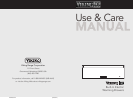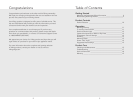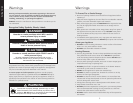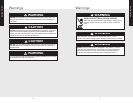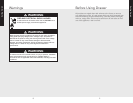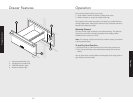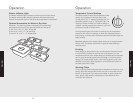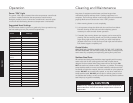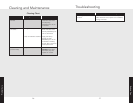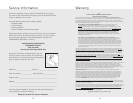
1514
Operation
Operation
Power “ON” Light
The power “ON” light is located above the temperature control knob
on Custom models and below the temperature control knob on
Designer models. It turns on when the control knob is set and cycles
on and off with the heating element as temperature is maintained.
Food
Temperature
Settings
Bacon 2 –3
Beef, medium and
well done
2
Beef, rare 1 –2
Bread, hard roll 2
Bread, soft rolls 2
Casseroles 2
Cooked cereal 2
Dough, proofing 1
Eggs 2
Fish, seafood
(baked)
2
Fried foods 3
Fruit 2
Gravy, creamed
sauces
2
Ham 2
Pancakes, waffles 2 –3
Pies, one crust 2
Pies, two crust 2
Pizza 2 –3
Pork 2
Potatoes, baked 3
Potatoes, mashed 2
Poultry 2 –3
Vegetables 2
Suggested Heat Settings
The information below is given as a guide only. You may need to vary
the heat settings to suit your personal requirements.
Product Care
Cleaning and Maintenance
Any piece of equipment works better and lasts longer when
maintained properly and kept clean. Cooking equipment is no
exception. Your warming drawer must be kept clean and maintained
properly. Make sure all controls are in the “OFF” position.
1. Allow warming drawer to cool completely.
2. It is important to keep the slide rails clear and free from debris.
Periodic cleaning of slide rails and other adjoining parts is
necessary to assure smooth drawer operation.
3. If needed, the warming drawer pan support can be removed for
cleaning. Pull the warming drawer out until fully extended. Slide
finger along right and left side rail until you reach hand latches
(located at the front of rails). Pull up on both right and left latches.
Pull drawer support completely out.
Control Knobs
MAKE SURE ALL CONTROL KNOBS POINT TO THE “OFF” POSITION
BEFORE REMOVING. Pull the knobs straight off. Wash in detergent and
warm water. Dry completely and replace by pushing firmly onto stem.
Stainless Steel Parts
All stainless steel body parts should be wiped regularly with hot soapy
water at the end of each cooling period and with a liquid cleaner
designed for that material when soapy water will not do the job. DO
NOT use steel wool, abrasive cloths, cleansers, or powders. If necessary,
scrape stainless steel to remove encrusted materials, soak the area with
hot towels to loosen the material, then use a wooden or nylon spatula or
scraper. DO NOT use a metal knife, spatula, or any other metal tool to
scrape stainless steel. DO NOT permit citrus or tomato juice to remain
on stainless steel surface, as citric acid will permanently discolor stainless
steel. Wipe up any spills immediately.
CAUTION
DO NOT use any cleaning agent with chlorine or chlorine compounds on
stainless steel finish. Chlorine and chlorine compounds are corrosive to
stainless steel.



